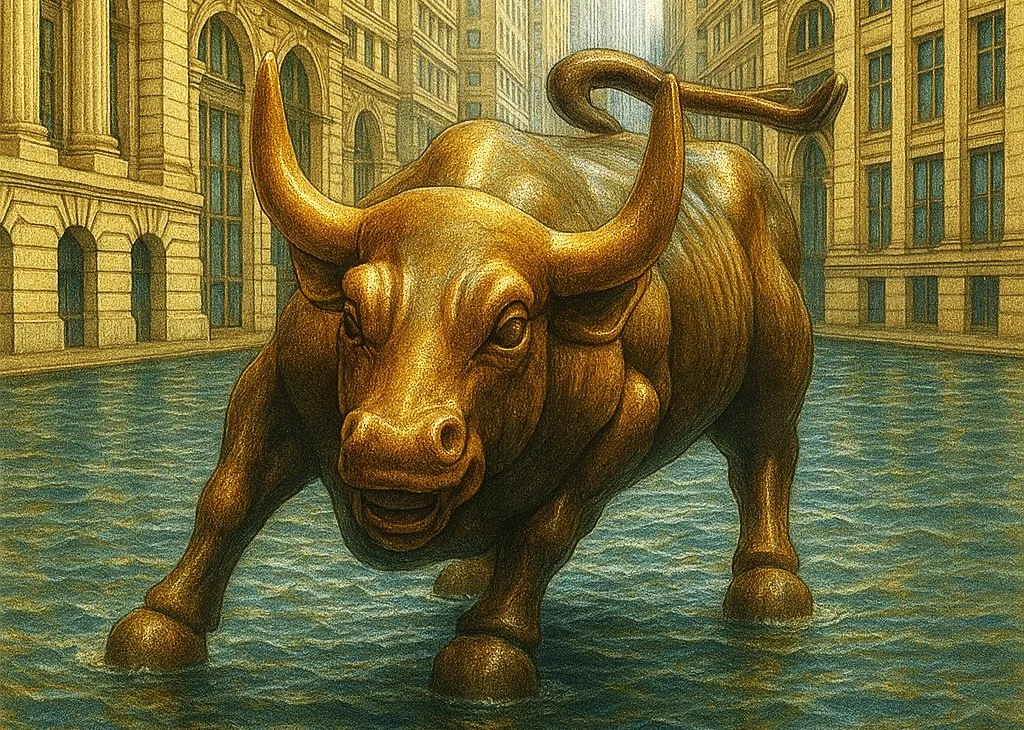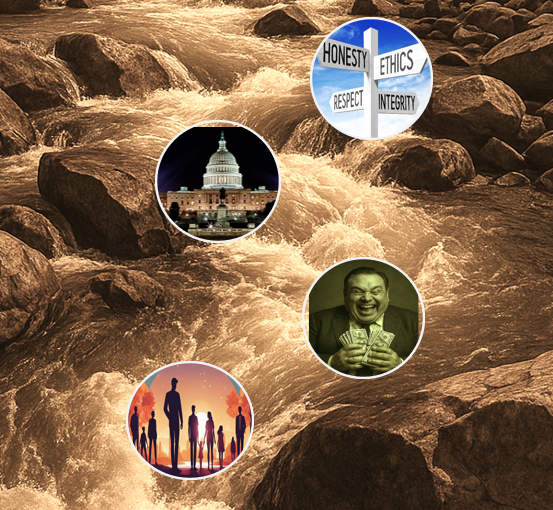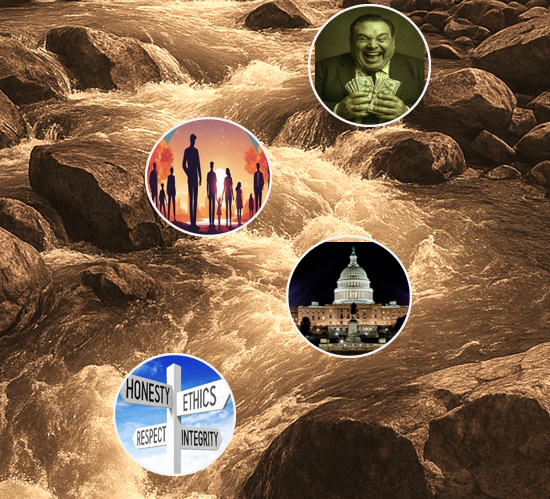Who’s Upstream Now, Bitches?
/America sucks because we gave up on it
By Don Varyu
Jul 2025
n our deeply divided America, we only agree on one thing: we are broken. People on the right point the finger of blame at the left. People on the left point their fingers directly at Donald Trump.
But Trump did not cause our problem. He is only the perfectly depraved result of it. Millions of us may quietly muse about the day when he is gone. But we won’t magically “snap back to normal”. The problem will remain.
And we can not hope to solve that problem unless we properly understand it.
n 2012, a book titled, “Why Nations Fail” won a Pulitzer Prize in economics. Its thesis was pretty simple. Countries that succeed allow the wide distribution of opportunity and prosperity among its citizens. Those that falter direct wealth and opportunity to a very narrow sliver of very rich people at the top. The authors’ convincing series of historical examples span wide swaths of time and geography…and they make their argument almost irrefutable.
oday, it is common to refer to some entity or force as being “upstream” from something else. In other words, upstream precedes. It helps direct and form whatever follows. A simple example: a toddler needs to learn to count before she can add or subtract. Counting is upstream.
The book’s authors point out that all nations develop both political and economic systems. But the ordering of these two is fixed: “…it is politics, and political institutions, that determine what economic institutions a country has.”
America prospered because democracy granted its citizens the vote—a means of electing and removing their leaders. Sure, farmers might see politics differently than union autoworkers. But this distribution of voting power enabled a reasonable chance for Americans to build wealth.
At one time, Great Britain’s “empire” was the mightiest political force on Earth. And yet, America resoundingly passed it to become the world’s leading economic power.
The reason was a central difference in social structure between the two. A telling example is illustrated by the granting of patents. In England, patents (not just for inventions, but for entire industries) were granted at the favor of the king. His patents made already wealthy friends even richer.
In contrast, in America, Thomas Edison (the last of seven children from a struggling family) would eventually be granted more than 1,000 separate patents by his government. Here, merit trumped monarchy. And it was how the two systems were dissimilar that determined different outcomes.
But now? My contention is that the essential difficulty of America at this moment is the collapse of common opportunity in favor of history’s far more prevalent legacy of iron rule and corruption.
America’s essential structure has flipped. Money is now decidedly upstream from government.
That may seem obvious; after all, the evidence is all around us. After all, every one of Trump’s initiatives involves the transfer of wealth.
But I don’t think it’s that simple. I want to toss a couple of other factors into the stream.
t’s hard today to imagine the blast that Thomas Jefferson ignited with his Declaration of Independence. From its opening words, “We, the people…”, through his phrasing, “…of the people, by the people and for the people…”, Jefferson sent shock waves across the developed world. European monarchies at first were offended and dismissive—but then they began to quake. You could imagine their reactions beginning like this: “The audacity! To think that mere commoners should be in control!”,,,but then, in private, shifting to, “what if this thing ever takes hold here?”
Most continental nations tried to avoid that thought as long as possible. But France suddenly realized it was too late. Seemingly without warning, their revolution erupted in 1789. The world could ignore the new demands of freedom no more.
In that same year, the Founding Fathers finished the nuts-and-bolts work of turning Jefferson’s soaring rhetoric into an owner’s manual. They built a constitution that contained flaws and compromises that still haunt us today. But among their successes was laying out a path that would make America the world’s dominant economy. The same mechanism that would allowed a “nobody” like Edison to imagine and invent and prosper…also laid a road to a central currency, competitive banking and property laws. This apparatus served entrepreneurs, investors—and citizens.
It also built guard rails that exposed even the very richest to the rule of law. In 1998, Bill Gates was the world’s richest man. But that didn’t prevent Microsoft from losing an anti-monopoly case to the federal government. The system was working.
It worked because upstream of everything were the elements of ethics and integrity and fair play and law. People agreed to all this. Yes, there would always be someone trying to game the system. But our general sense of a commpon social morality held firm.
We believed in ourselves.
he other factor I’ll add to the stream is culture. In particular, the nature of our society in the way Americans relate not to a concept,but to each other.
The first European settlers logically brought with them many trappings from their former hometowns in England. But on a new and rough continent, they found themselves operating in a very unsettled world. They had to adapt to the unknown…with vast surroundings that were wild, mysterious and usually dangerous. There was no time for afternoon tea. There was no local branch of the royal court back home to serve or protect them. America developed a culture where people were required to depend on each other—and respect each other. We didn’t have any choice. No barn was raised by one man.
Culture was the end result of everything else.
ell, if you’ve read this far, you’re probably wondering, “what the hell is he talking about? What’s the point of all this?!”
My short take is this. Today, the ordering of these main elements—politics, economics, morality and culture--have been structurally reordered. And not for the better. The system that preserved us and bonded us…the one that lasted over two centuries…today is perverted.
So first, if you were to visually depict America’s traditional “stream”, here’s how it had always flowed—beliefs formed the govrnment, government wrote the rules for business, and culture flowed from all of the above:
Here’e the perversion of today. Greed rules all; America obeys wealth:
At the top, the unquestioned champion is the accumulation of the greatest possible wealth among the smallest number of people.
WEALTH is the focus—everywhere. From the Oval Office to Wall Street to the commentators on CNBC. (And think about CNBC for a minute. Its only occupation, 24 hours a day, is reporting and speculating on how the value of markets and investments go up or down. Then also consider that the top 10% of American households possess 93% of all stock holdings. Where is the 24-hour news channel dedicated to the economic realities of the other 90%?) Our national heroes include Elon Musk, Jeff Bezos and Jeff Zuckerberg. It’s nauseating.
Following pornographic wealth, the most influential element in our society is CULTURE. This is not by accident. Culture is now mesmorized by technology, AI, social media and cryptocurrency—and guess who controls that? Primarily, a royal court of people including the clown princes mentioned in the last paragraph. In another sense, you can define ‘culture’ in a different way—the dominance of “cultural issues” in politcs. Which leads us to element #3…
The influence of POLITICS has melted away under the blowtorches of wealth and culture. Big money blithely purchases politicians and their votes. Similarly, because our highest court has declared that “comnpanies are people, too”, the cap has come off all campaign finance limits. Which is why Elon Musk could spend nearly $300 million to elect Trump—and is now promising to spend more to defeat Trump loyalists.
Finally, at the bottom of our polluted stream, lie the shredded remains of honesty and ethics. The things we once prized most are now targets of mockery. The cheat code for making it in America today is corruption. Only fools think otherwise.
he authors of How Nations Fail say history has one consistent answer on how to combat all this: revolution. And they note that historically, peaceful ones work much better than violent ones. (In the end, Les Misérables stayed miserable for quite a while.)
Mass protests are necessary and helpful. (Althugh “No Kings” seems a little tardy when we already have one.) But citizen protest also has to find allies from other quarters. First of all, from responsible media. Journalism once prided itself on, “comforting the afflicted and afflicting the comfortable.” How quaint. Journalism now seems obsessed with running away from potential Trump lawsuits. It’s time for journalism to stand up and do its job properly. Their overriding purpose is not to reward shareholders. Journalism needs to remember that it, too, has freedom of speech.
Ironically, this is also true for trembling corporate boards. Thier companies can actually profit from their own public protests. What would happen to a global consumer goods company wiling to yell, “these tariffs are wrong—they’re killing us, and in the end they’ll mean higher prices for our customers”. New customers would flock to them.
In a country where roughly two-thirds of all people now oppose most of Trump’s signature policies, which companies and institutions dare to speak the obvious truth?
began by asserting that Trump is the result of the problem, not the problem itself. The poisonous rejiggering of our society--moving from “who you are” to “what you make”--began in earnest back in the 1980’s. In the eyes of the plutocrats and the religious whack jobs and the war mongers who Ronald Reagan unleashed, he was a perfectly useful idiot. They told him what to say and do…and he obeyed. For those backers, Clinton and Obama were just speed bumps. Their throughline was working tirelessly to rewrite tax laws, abolish regulations, pack the Supreme Court and insert “God” into every corner of government they could.
They created our Frankenstein monster, then used their weak-minded high court to give that monster immunity from any crime it could imagine while President.
Which is to say that even when Trump finally walks off the stage, that stage will still be littered with piles of stinking garbage.
o clean it all up will take an incalculable amount of time, and perpetual effort. Our solutions will take many forms, some of which need still to be invented.
But avove all, our efforts must live downstream from the same headwaters; the sentiment that formed us in the first place: “We…the people…”.
We are our own heroes.







